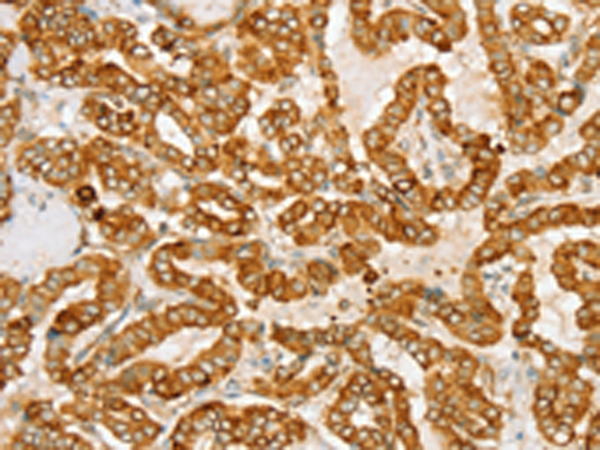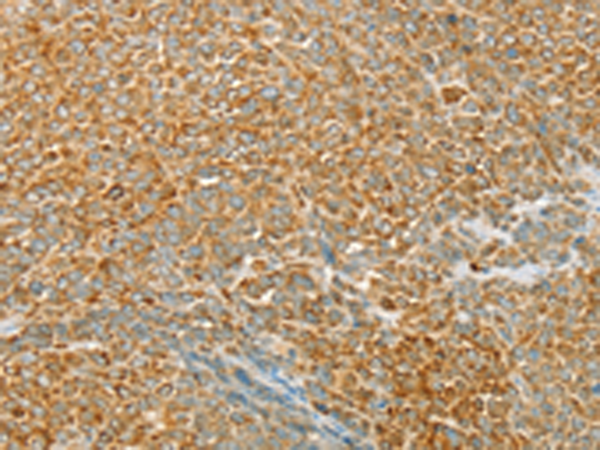

| WB | 咨询技术 | Human,Mouse,Rat |
| IF | 咨询技术 | Human,Mouse,Rat |
| IHC | 1/30-1/150 | Human,Mouse,Rat |
| ICC | 技术咨询 | Human,Mouse,Rat |
| FCM | 咨询技术 | Human,Mouse,Rat |
| Elisa | 1/2000-1/5000 | Human,Mouse,Rat |
| Aliases | LYP; PEP; LYP1; LYP2; PTPN8 |
| Host/Isotype | Rabbit IgG |
| Antibody Type | Primary antibody |
| Storage | Store at 4°C short term. Aliquot and store at -20°C long term. Avoid freeze/thaw cycles. |
| Species Reactivity | Human, Mouse |
| Immunogen | Fusion protein of human PTPN22 |
| Formulation | Purified antibody in PBS with 0.05% sodium azide and 50% glycerol. |
+ +
以下是关于PTPN22相关研究的3篇代表性文献摘要(注:PTPN22的研究多集中于基因多态性,而非针对其蛋白的抗体;若需针对PTPN22抗体的研究,可能需更专业检索):
1. **文献名称**:*A functional variant of lymphoid tyrosine phosphatase is associated with type I diabetes*
**作者**:Bottini N, et al.
**摘要**:该研究发现PTPN22基因的C1858T错义突变(R620W)与1型糖尿病显著相关,揭示了该变异通过干扰T细胞受体信号通路,增加自身免疫疾病易感性。
2. **文献名称**:*Genetic association of the R620W polymorphism of protein tyrosine phosphatase PTPN22 with human SLE*
**作者**:Kyogoku C, et al.
**摘要**:研究证实PTPN22 R620W多态性与系统性红斑狼疮(SLE)的遗传关联,提示该变异通过改变淋巴细胞活化阈值参与系统性自身免疫发病机制。
3. **文献名称**:*A missense single-nucleotide polymorphism in a gene encoding a protein tyrosine phosphatase (PTPN22) is associated with rheumatoid arthritis*
**作者**:Begovich AB, et al.
**摘要**:通过大规模病例对照研究,发现PTPN22 R620W突变显著增加类风湿性关节炎风险,尤其抗CCP抗体阳性患者中关联更强,支持其在自身免疫中的广泛作用。
如需针对“PTPN22抗体”的研究(如检测或病理意义),建议进一步检索特定数据库(如PubMed),使用关键词“PTPN22 autoantibody”或结合具体疾病名称。
The protein tyrosine phosphatase non-receptor type 22 (PTPN22) gene encodes lymphoid tyrosine phosphatase (LYP), a key regulator of immune signaling. LYP modulates T-cell receptor (TCR) and B-cell receptor (BCR) signaling by dephosphoryulating kinases like Lck and ZAP-70. thereby fine-tuning lymphocyte activation. A single-nucleotide polymorphism (SNP), C1858T (R620W), in PTPN22 is strongly associated with autoimmune diseases, including rheumatoid arthritis, type 1 diabetes, and systemic lupus erythematosus. This gain-of-function mutation disrupts LYP’s interaction with CSK, impairing its ability to suppress TCR signaling, leading to altered T-cell tolerance and hyperactive immune responses.
PTPN22 autoantibodies are less commonly studied than the genetic variant but may serve as biomarkers in specific autoimmune contexts. Their presence has been linked to disease severity or progression in conditions like autoimmune thyroiditis or juvenile idiopathic arthritis. The exact role of these antibodies remains unclear, though hypotheses suggest they may interfere with LYP function or promote inflammatory pathways.
Research on PTPN22 highlights its dual role: certain variants increase autoimmune risk, while others may confer protection against infections. Therapeutic strategies targeting PTPN22 pathways, including small-molecule inhibitors or monoclonal antibodies, are under investigation to restore immune balance in autoimmune disorders. Understanding PTPN22’s mechanisms offers insights into personalized treatments for immune dysregulation.
×